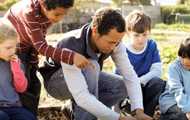Community Profile: Minneapolis, Minnesota
This program is no longer funded. Learn more about current DCH programs.
Obesity Prevention

“MINNEAPOLIS RESIDENTS WITH THE GREATEST HEALTH BARRIERS ARE NOW SURROUNDED BY A NETWORK OF HEALTHY EATING AND PHYSICAL ACTIVITY RESOURCES.”
— R.T. Rybak, Mayor, City of Minneapolis
Download profile PDF[PDF–1.01MB]
Additional Resources
For more information, please visit
www.minneapolismn.gov/dhfs
“FRUITS AND VEGETABLES ARE MORE AFFORDABLE THAN THE GROCERY STORES. I CAN FEED MY CHILDREN BETTER AT THE FARMERS' MARKET WITH MY EBT BENEFITS.”
— Minneapolis resident
Communities Putting Prevention to Work (CPPW) is an initiative designed to make healthy living easier by promoting environmental changes at the local level. Through funding awarded by the Centers for Disease Control and Prevention in 2010, a total of 50 communities are working to prevent obesity and tobacco use—the two leading preventable causes of death and disability.
Community Overview
Minneapolis, Minnesota, is tackling obesity throughout the community of 382,578 residents. More than one in five (24%) Minneapolis adults are obese and only 20.3% of adults eat the recommended daily servings of fruits and vegetables. Additionally, 23.1% of public school students are overweight or obese. Obese youth are more likely than youth of normal weight to become overweight or obese adults, lacing them at an increased future risk for heart disease, type 2 diabetes, stroke, cancer, and osteoarthritis. Through the development of biking routes, farmers' markets, and community gardens, Minneapolis has made great strides in creating opportunities to increase physical activity and improve nutrition. However, remaining barriers related to access and cost prevent many residents from increasing physical activity levels and purchasing healthy, fresh foods. A range of CPPW activities address these barriers.
Top of PageCommunity Successes
If healthy options are not available, then healthy living is not possible. With the support of the CPPW initiative, Minneapolis has implemented a variety of changes throughout the community to make healthy living easier.
To decrease the prevalence of obesity, Minneapolis:
- Developed customized plans for the implementation of a Safe Routes to School program in 10 local schools. This effort will increase opportunities for approximately 5,900 students to walk and bicycle to school.
- Established an EBT system, enabling residents to use EBT cards to purchase fresh produce, and a Market Bucks program that incentivizes EBT card use through a dollar-for-dollar match for residents purchasing market tokens on their EBT cards. Over a 15-month period, six markets with these systems served more than 700 customers with approximately $34,000 in EBT sales and $12,000 in Market Bucks redeemed.
- Conducted a public awareness initiative, Making It Better, in partnership with the Minnesota Department of Health and Olmsted County, to promote healthy lifestyles through physical activity and healthy eating. This initiative is estimated to reach more than 1.36 million people.
- Created Local Food Resource Hubs, an initiative designed to provide Minneapolis residents and community gardeners with the tools and education needed to grow, preserve, cook, and compost their own produce. To date, the program has more than 600 members, including 435 individual memberships and 61 community garden memberships.
- Installed 244 signs throughout the city to help residents identify safe walking and biking routes as well as distances to major destinations.
(The list above is a sample of all activities completed by the community.)
Top of PageNew Bike-Share Kiosks Available in North Minneapolis
Minneapolis is increasing physical activity through the expansion of bike-share kiosks to underserved areas of the city. To date, Minneapolis' Nice Ride bike-share program has added eight new kiosks in North Minneapolis, for a total of 11 kiosks in that part of the city. North Minneapolis has significant health disparities, including some of the highest rates of chronic diseases linked to obesity in Minneapolis. While the north part of the city does not enjoy the same level of bike access and infrastructure as other areas of Minneapolis, this effort is increasing transportation options for residents and is contributing to the area's biking and walking culture. Over a three-month period, residents took more than 1,800 rides from new bike kiosks. Through the Bike Walk Move campaign, which community members have viewed in the media approximately 81 million times, residents are being encouraged to use biking and walking resources throughout Minneapolis.
Top of PageLeadership Team
The leadership team includes high-level community leaders from multiple sectors, who have the combined resources and capacity to make healthy living easier. Members of Minneapolis' leadership team are key agents for change in their community. The leadership team includes representatives from the following organizations:
- City of Minneapolis Mayor's Office
- Allina Hospital System
- Bike Walk Ambassadors Program
- Division of Indian Work
- Hennepin County Public Health
- Little Earth of United Tribes
- MIGIZI Communications
- Minneapolis Park and Recreation Board
- Minneapolis Public Schools
- Minneapolis Urban League
- University of Minnesota
- Ward 2 City Council
- Page last reviewed: October 25, 2013
- Page last updated: October 25, 2013
- Content source:


 ShareCompartir
ShareCompartir